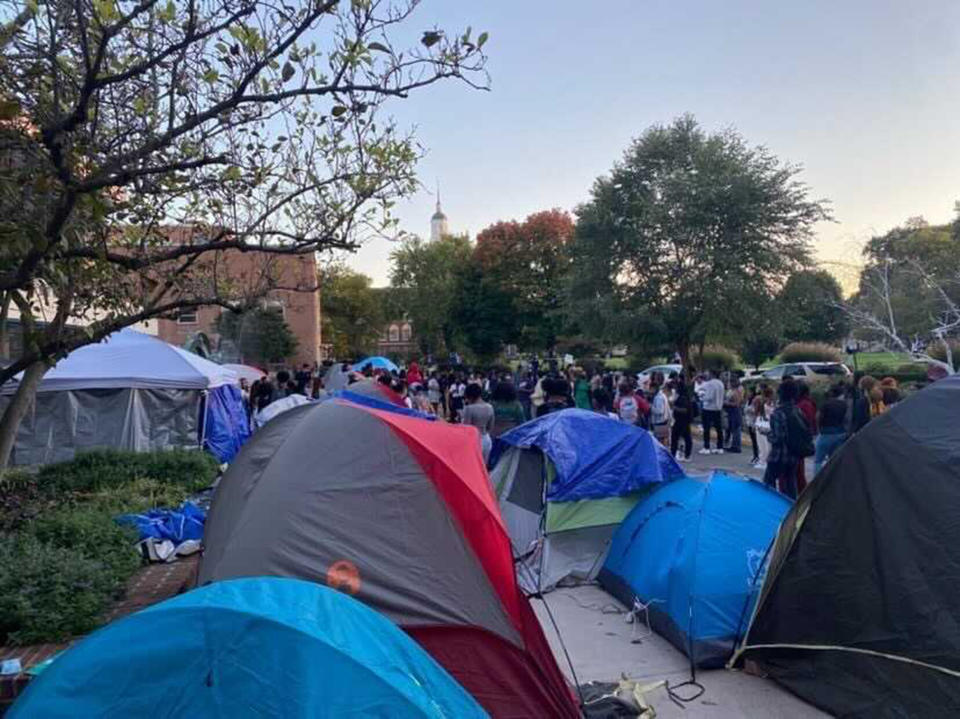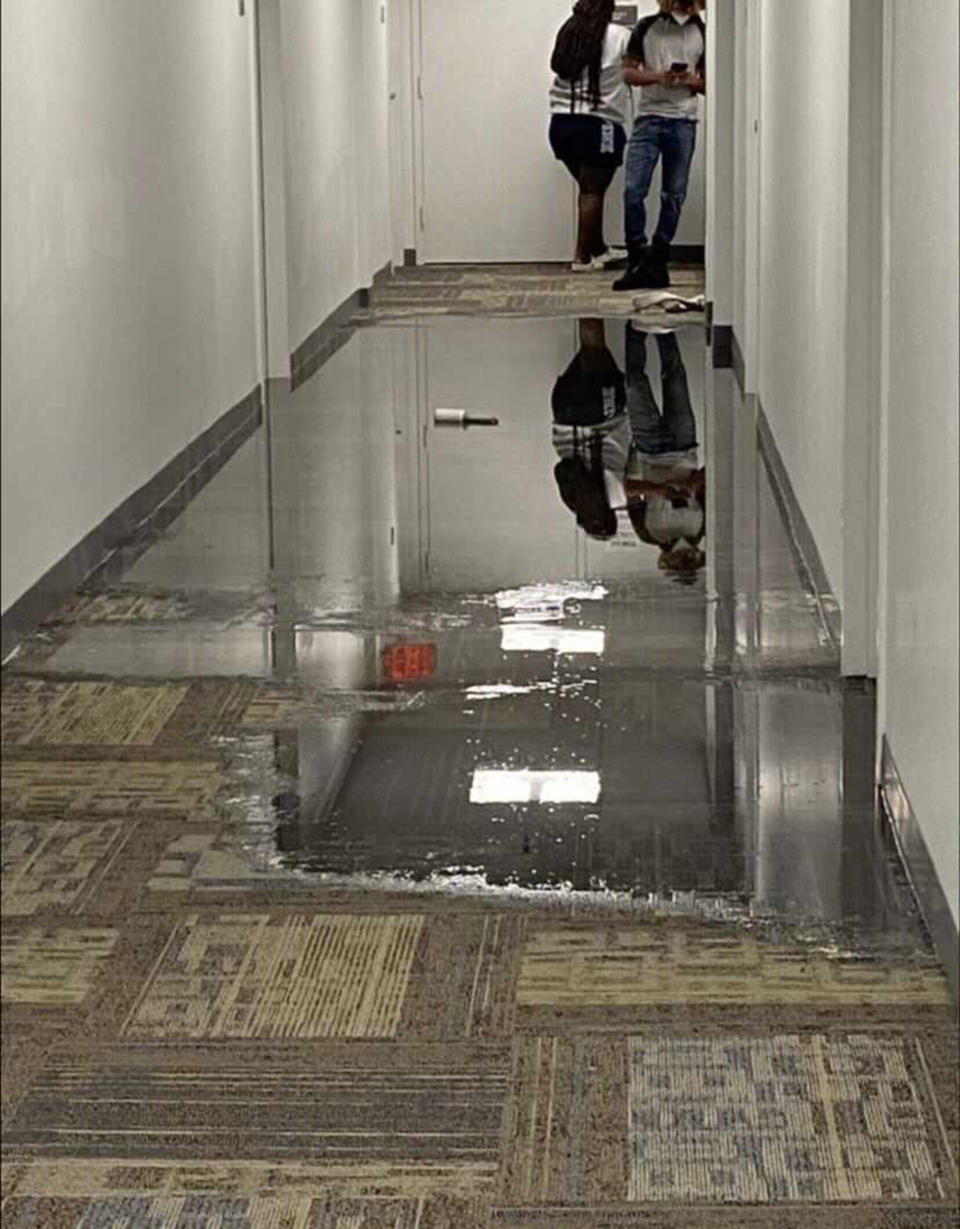Howard U's housing issues aren't new. They've just hit a boiling point.
A version of this article was published on Today.com.
The Howard University community was not surprised when undergraduate students started occupying the student center two weeks ago in protest against living conditions in residential halls.
The Washington, D.C., university, one of the nation's leading historically Black schools, has recently been under fire after mold was identified in at least 38 dorm rooms out of 2,700 total rooms on campus, a university official confirmed to NBC News. Students have also complained about rodents, flooding and other haphazard conditions. But both current students and alumni have raised concerns over the condition of some residence halls for decades.
In 2018, students occupied the administration building for nine days before reaching an agreement with university officials who promised to meet their demands, according to NPR. And in 1989, up to 3,000 students occupied the administration building for almost a week over housing conditions and other issues, according to The Washington Post.
Chandler Robinson, a first-year student who is part of The Live Movement, said protests in 2016 and 2017, in addition to 2018 and this year, have resurfaced the same issues. Robinson, her fellow student Channing Hill, a junior who’s a part of The Live Movement campus organization that co-organized the sit-in at the Blackburn Center, and Yedidya Kefale, also a student, who said she was hospitalized for mold exposure on campus, said students have not seen enough action to fix the problems.

That's why a group of students has been occupying Blackburn University Center for two weeks now in a sit-in known as the "Blackburn Takeover." The students issued a list of demands via The Live Movement’s Instagram. The demands include permanently reinstating all affiliate board positions, a town hall with the school’s president, legal and academic immunity and Howard leadership sharing a detailed housing plan that fixes the problems.
Howard President Wayne Frederick released a statement Tuesday morning saying the school has already shared a detailed housing plan. He also called for the occupation to end.
“There may be areas where we agree to disagree," Frederick wrote. "That’s the nature of a vibrant community. However, Howard University’s proud tradition of student protest has never been — and can never be — invoked as a justification for tactics that harm our students. The current occupation of the Armour J. Blackburn Center is a departure from past norms. There is a distinct difference between peaceful protest and freedom of expression and the occupation of a University building that impedes operations and access to essential services and creates health and safety risks.”

Frank Tramble, Howard’s vice president and chief communications officer, said in a statement to "TODAY" that Howard’s provost and general counsel met with some protest leaders Monday “and engaged in a discussion regarding their extended protest and a possible path forward. ... The university is willing to continue engaging in substantive conversations with our students regarding their expressed concerns, but the occupation of the Blackburn Center has to end before we agree to do so.”
Howard has eight residential halls, at least four of which are recently renovated. But students say the figures are misleading.
“The buildings themselves aren’t in terrible condition. It’s the maintenance of them,” said Nira Headen, who graduated in May.
Hill said part of the maintenance discrepancy is not due to a lack of funding but the allocation of those resources, and "that affects the students.” Like most schools, Howard receives annual federal funding and outside donations, including $40 million last year from the philanthropist MacKenzie Scott, the former wife of Amazon founder Jeff Bezos. Frederick said in his full statement that Howard has allocated $2 billion toward completed and future renovation projects.
President Joe Biden has also promised increased funding to historically Black colleges and universities.
Frederick said, “The truth remains that all of our students deserve a best-in-class dormitory experience at Howard, and we will continue to do our best to ensure that they receive it. While there have only been a small number of documented facilities reports relative to our entire inventory of residence rooms, we are actively inquiring about unreported issues that may be in the residence halls by going door to door to interview and assist each resident.”
Still, Robinson, Kefale and Hill said students think Howard has been slow to move and unresponsive to the demonstration, other than to tell protesters to leave.
“Hopefully they understand that we are very serious in the fact that we are not moving,” Robinson said. “I think they have yet to take us seriously. I think that they see us as children. But we are young adults who are being exposed to hazardous conditions that can affect us for the rest of our lives.”
How alumni and professors are helping
Robinson said that some alumni are staying overnight in Blackburn in solidarity with the protesters, while other alumni have been vocal on Twitter in support of students.
One alumni tweeted: “My beloved Howard University is on the wrong side of history this time around. Give these babies what we been asking for since I can remember stepping foot on campus in 2011.”

Brittney Cooper, a Howard alumni and gender studies professor at Rutgers University, tweeted, “I love Howard and anyone who knows me knows this. And that is why I stand unequivocally with the students of #BlackburnTakeover and against any attempts by the admin to silence them. Student housing was an issue 20 yrs ago when I was there and for decades before. It has to change.”
Students say Howard has threatened them with legal action if they don’t leave Blackburn and "TODAY" obtained videos of campus security physically intimidating protesters.
This sit-in is the latest happening. There was a cyberattack at the beginning of the semester that shut down Wi-Fi for one month. Kefale and Robinson said students are still behind in their classes and that internet access regularly goes in and out.
Between the sit-in and shaky Wi-Fi, professors are showing some flexibility. Robinson said some professors have started teaching their classes at the protest and that in general they’re “very understanding” of the Wi-Fi situation because it affects them, too.

Marcus Alfred, a professor of physics and astronomy and chair of the faculty senate, said in a statement to "TODAY" that the faculty organization is supporting students in a number of ways.
“We voted to recommend that the HU Administration and Board (among other things) address student housing, reinstate affiliate trustees, hold open town halls with students, and neither punish nor retaliate against student protestors,” hed wrote in an email, adding that the senate has encouraged colleagues to offer as much academic flexibility to protesters as possible.
Howard eliminated student, alumni and faculty affiliate positions from the board of trustees in June, a move students say lacks transparency.
“Part of the issue is the university refuses to talk directly to the student body,” Hill said. “We have no students, alumni, trustees or representatives on the board. Who does the university even have to listen to? They’re not in a position to be accountable to the student body.”

Howard defended the removal of those positions in an Oct. 15 email sent to university students and employees and obtained by "TODAY."
“We remain committed to our decisions to update the board structure,” the email said, while adding that over 60 percent of board members are alumni and past elected student affiliate trustees who were not seated due to the pandemic can still serve their term. “The revised board structure, combined with our determination to broaden our community engagement will allow more — not fewer — voices to be heard.”
Among other demands, students want financial compensation since they are still required to pay the full cost of attendance.
Hill added, “Why is it that I’m paying $48,000 a year, but can’t get a room without mold in it?”

